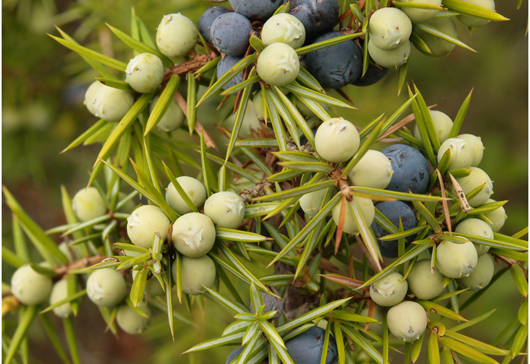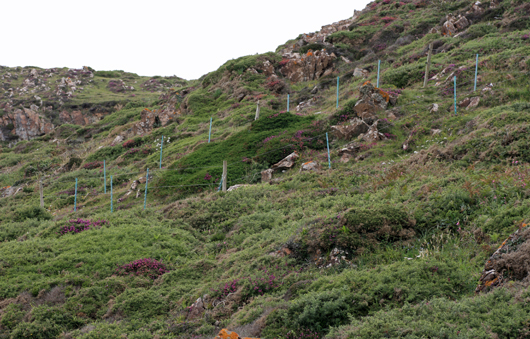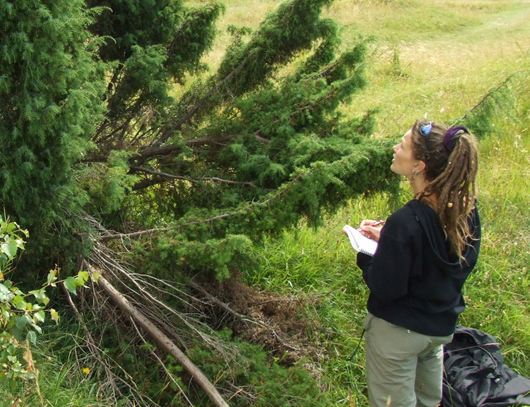UK: Losing the taste for gin?
29.04.10
Juniper (Juniperus communis) is probably best known for being the principal flavouring in gin; the scourge of housewives up and down the country. But a new survey highlights a different problem - its slow march to possible extinction in the next 50 years.

Juniper berries © Andrew Gagg/Plantlife
"Without action now, juniper faces extinction across much of lowland England by 2060,” said Tim Wilkins, Plantlife’s Species Recovery Coordinator. But the demise of juniper is a confusing one. Clearance, over-grazing, under-grazing, scrub fires, and the low economic value of the plant have probably all contributed to its decline. Once widespread, but rarely contiguous, over much of the UK, some populations have lost up to 70% in the last few decades alone, according to Plantlife.
The main habitats for juniper are pine woodland, heathland, moorland, and limestone grassland. Although there are some significant stands of trees remaining, this seems to hide the fact that there is very little successful new recruitment. This fragility is compounded by the relative isolation of some populations.

Isolated female juniper bush Lizard, Cornwall, probably the hemisphaerica sub-species.
Fenced off to prevent over-grazing. © Alistair Griffiths
Juniper has a long and and famous history in the UK. One of the first plants to move in after the ice retreated it very quickly became useful as a flavouring for meat dishes and a food plant. But it was the rapid rise in the popularity of gin that really drove juniper into the public eye. In the 11th century Italian monks began to use juniper as a flavouring in distilled spirits, but the real catalyst for change wasn't till much later when the English government allowed unlicensed gin production. The word gin is derived from the French word for juniper berry genièvre.
The imposition of taxes on imported spirits and the availability of poor quality grain meant that by 1740 the production of gin outstripped the production of beer by six to one and approximately half of the 15,000 drinking establishments in London were gin shops! It's relative cheapness made it very popular with the poor and was presumed - probably rightly - to be the cause of many of the social problems in the 18th century. These gin-soaked days are immortalised in William Hogarth's painting Gin Lane.
But, looking to the future the launch of Plantlife's survey may provide the incentive to save this important element of the UK landscape. And as Plantlife say, "losing juniper would mean more than just losing a single species - it also supports more than 40 species of insect and fungus that cannot survive without it."

A juniper survey is an important first step in safe-guarding the species.
© Tim W/Plantlife
Plantlife's new project is taking action to tackle the loss of juniper and the ageing of juniper populations by trialling new techniques which could save it from extinction in southern England. More than 30 project sites across the region (including sites in Buckinghamshire, Gloucestershire, Hampshire, Oxfordshire, West Sussex and Wiltshire) are included in the project.
A new public survey is also launched today, and Plantlife hopes that hundreds of volunteers across southern England will get out and look for juniper bushes, to provide the latest information about the numbers, age and condition of the junipers across the region.
Related links:
UK Biodiversity Action Plan Juniperus communis
Juniper - down the hatch? (Plantlife)
19.04.10
 As spring begins to take a firm hold on the British countryside the timing is perfect for the launch of Plantlife's Wildflowers Count - the successor to Common Plants Survey.
As spring begins to take a firm hold on the British countryside the timing is perfect for the launch of Plantlife's Wildflowers Count - the successor to Common Plants Survey.
15.04.10
 Records have started appearing at the National Trust's bluebell watch. First out of the blocks was Blickling Hall in Norfolk, closely followed by Downhill Demensne and Hezlett House in Northern Ireland.
Records have started appearing at the National Trust's bluebell watch. First out of the blocks was Blickling Hall in Norfolk, closely followed by Downhill Demensne and Hezlett House in Northern Ireland.
UK: Recovering from the winter blues
06.04.10
 The unusually harsh winter has taken its toll on many UK species while others seem blissfully unaware and are merely getting on with business as usual. But one plant which has almost certainly been stalled by the cold weather is the bluebell (Hyacinthoides non-scripta).
The unusually harsh winter has taken its toll on many UK species while others seem blissfully unaware and are merely getting on with business as usual. But one plant which has almost certainly been stalled by the cold weather is the bluebell (Hyacinthoides non-scripta).